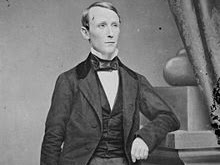Handsome fellow – and also one hell of an original American Eccentric. Walker started out life in Tennessee, got his first college degree at fourteen and his medical degree at the age of nineteen. He practiced medicine, studied the law, ran a newspaper, and did some time as a reporter. Geographically he bounced around from his home state to New Orleans, LA and then on to San Francisco, CA. When he got out west Walker found his passion – conquering land south of the current borders of the United States to establish new American colonies in Latin America. We all have to have ambitions in life and Walker’s was building new nations or conquering existing ones. What makes him stand out is that he was actually somewhat successful at it.
In 1853, at the tender age of twenty-nine, Walker recruited a total of forty-five men and set out to into Baja California with the goal of establishing a new republic – one built around the ideas of Manifest Destiny, expanding slavery, and joining up with the United States through annexation like Texas had done. Walker had started out attempting to convince the Mexican government to just give him the land to set up an armed colony against attacks by Native Americans – Mexico was uninterested in Walker’s plan though. Most people would have given up at that point – Walker conquered a city in Baja and proclaimed a new republic – the Republic of Senora. It didn’t last long though – the Mexican government decided that Walker’s new state was an unacceptable addition to the local Baja scene and crushed it militarily. But from that Walker moved on to a greater dream – conquering a Latin American nation that was already established.
In 1855 Nicaragua was embroiled in a nasty civil war and Walker, leading a group of fifty-eight Americans nicknamed “The Immortals” Walker was able to ally with local military forces in Nicaragua and successfully defeat all opposing factions in Nicaragua – Walker initially ruled through a puppet president but then elevated himself to the office of President of Nicaragua. He actually held the office for a year and eleven months, his government was formally recognized by the United States, US President Franklin Pierce provided that honor. Walker lost power due to his ambitious, but failed efforts, to expand his holdings into nearby Costa Rica and was military defeated by an alliance of surrounding states. Walker escaped punishment and capture by surrendering to a US naval warship in 1857.
He returned to the United States and by 1860 he had written a four hundred page tome explaining his actions in Nicaragua and his administration. He was hailed as a hero throughout the southern United States. Walker also in 1860 made another attempt to carve out a nation, he sailed secretly to Honduras to take advantage of some dissatisfaction brewing in Honduras among its wealthy, non-local residents. Unfortunately for Walker his ambitions in the region raised concerns with the British government, who had a vested interest in Honduras staying stable, so when Walker arrived in Honduras a local British naval captain captured him. Walker was then handed over to the government of Honduras, which promptly shot him.
I’ll be reading up for more information on William Walker – I might someday write a book collecting eccentric and oddballs of US history and he’ll be in that collection. But Walker did impact history – his actions changed Nicaraguan history and modified how the US approached Central America in the early 20th century. (Bad memories by the locals of US involvement in their country among other things.)
Sources: Wikipedia entry on William Walker, California Native Newsletter article on William Walker, article on William Walker produced for the Virtual Museum of the city of San Francisco, and finally Lester Langley’s The Banana Wars – An Inner History of American Empire, 1900-1934.


